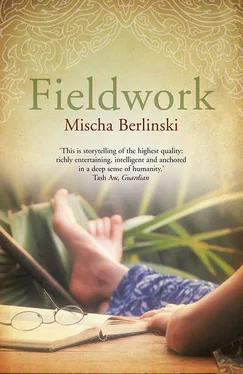That night, Martiya slept in her own hut with the door closed. She had a lot of work to do in Dan Loi, but now she was sure that she could do it. She lay on her mat and read by the light of her hurricane lamp for a long time. When she finally grew sleepy, she closed her book and blew out the yellow flame.
She had never felt so happy in all her life.
SO MUCH OF LIFEconsists of long puttering spells: when I look over my letters from those first few weeks of the rainy season, I find e-mails to and from my editor at the Bangkok Times , who asked me to write about the artist-in-residence at the University of Chiang Mai. To my mother, I wrote that Rachel and I took a class one Saturday afternoon in Thai cooking, and another in Thai massage. There was a letter to my grandmother, in which I told the story of the fourth-grade teacher at Rachel's school, a quiet Burmese woman, who broke her wrist in a tuk-tuk accident. Mr. Tim, I continued, asked me to take over her class while she convalesced, and for a week I taught school, an experience so exhausting that I didn't think once of anthropologists or missionaries, just savages.
None of these e-mails was exciting, but the events they depict were the real events that made up my days. Not one e-mail mentions Martiya or the Walkers; but not a day in that early monsoon passed when I didn't rifle through Martiya's letters (which ended shortly after her arrival in her new hut), or look through the extensive notes of my conversations with the Walkers. But as it happened, almost a month passed in which I made no progress, until I ran into Thomas Walker in the parking lot of the supermarket on the Chiang Mai — Lamphun Road.
I had never before seen Mr. Walker outside of the big pink house, and the sight of him in those waist-high slacks staring at the steel sky from under the supermarket awning took me aback: I was used to seeing him putter in a narrow triangle between the living room, his study, and the dining room; and although I had heard stories of him in China, in Tibet, in Burma, in Oklahoma; although Mrs. Walker had told me he was headed off to Mandalay — I hadn't really believed that he existed outside that house. Now he held a large bag of groceries in his left hand and was looking for his car keys, the man who in his youth had stolen sweets from the pockets of the future Tigi of Gartok.
I waved as I walked across the lot, but he seemed not to recognize me until I was right upon him; then he smiled and said, "Well hello, young man! I was telling Nomie just the other night that she must have scared you away!"
"Not at all," I said, and suddenly I could think of nothing else whatsoever to say. Judging by Mr. Walker's silence, he was in the same position. The two of us stood there for a moment bobbing our heads, and I think that if it hadn't started to rain at that moment, Mr. Walker would have excused himself a second later and retreated to his car, and I would have gone to buy my coffee and bananas.
But it did start to rain. There were three huge cracks of thunder like the sound of the giant wooden blocks that the Thai slam together to frighten crows in the rice field. Then, with no transitional drizzle, rain so fierce that I could not see the other side of the parking lot.
We stood for a few moments watching the downpour. Mr. Walker had done his shopping but was going nowhere, not in this weather. He said something to me, but the rain was too loud for me to hear him, and he shouted it over again. I finally understood that he was saying, "Let's go get a Coca-Cola." Mr. Walker's long fingers gestured in the direction of the tarpaulin-covered noodle stand abutting the supermarket, where long pale ducks hung on hooks above vats of boiling water.
We sat under the plastic tarpaulin drinking our Cokes. I asked about Judith and Tom Riley, and whether he and Mrs. Walker had had a good trip, but Mr. Walker just smiled back at me in mute incomprehension. The rain was that loud. Soon, the parking lot began to flood, and by the time we were done with our Cokes and the rain had dwindled to a last few furious drops, the water in the lot was nearly knee-high, every car in the lot submerged to just under the headlights.
Mr. Walker snorted through his nose. "Ever seen rain like this?"
"Yesterday," I said, but Mr. Walker hardly seemed to notice.
"Rains like the dickens here four months out of every twelve. Every day it'll rain here until September. Parking lot here gets flooded, I've been seeing it now some twenty years. It's not a mystery what you need to do to prevent this flooding, let the customers get home. All you have to do is build the lot on an incline, dig out a drainage ditch, and cement in that hillside. But they've got a different mentality here. That's the difference between a Christian and everyone else, you see. Only Christianity tells a man you've got to take precautions and come in from the rain, build a solid home, because the rains are coming."
I could have been any vague acquaintance who had met Mr. Walker by chance in that parking lot and drunk a Coke with him, and he would have been delivering the same speech, which I could only hear through David Walker's bored adolescent ears: "Is Dad giving the Flooded Parking Lot Speech again ?" Not that I entirely disagreed with Mr. Walker: a parking lot shouldn't flood every time it rains.
"You see, your animist or your Buddhist — they don't believe they have a relationship with God. They don't know how to find Him. So their fundamental point of view on life, you see, is powerless. It doesn't occur to them that they can change things, make things better. Dyalo knew we could help them, though. Right from the start. Back when we first came, family after family asked us, ‘Two thousand years! Why did it take you so long to come with God's word?' And we—"
Mr. Walker stopped talking, and his eyes looked past me out into the parking lot. He rattled the ice cubes in his glass of Coca-Cola.
"I'm sorry?" I said, thinking that he had asked me a question which I had failed to hear.
He sat silently for long enough that I thought of telling him it was nice to see him again and going into the store to do my shopping. But then Mr. Walker, with a note of absolutely uncharacteristic nervousness in his voice, said, "So did you find out anything about that woman?"
For a moment I wondered why he was so nervous. Then I realized that it was Norma. He was nervous that Norma might even suspect that he was discussing Martiya. I had never spoken to him without his wife in the next room, or without wandering into his study unexpectedly. But that's why, when he had seen me, he had asked me to have a Coke with him — so he could talk about the woman who had murdered his son without his wife nearby. I felt a sudden surge of sympathy for the man: a lifetime of outstanding bravery, and in his old age, Thomas Walker lived in fear of his wife.
And then I realized something else: the answer that he had given me when I asked why Martiya had killed David hadn't satisfied him either. He had told me that the devils and demons had made her do it — but he wasn't convinced. Like those Melanesian Islanders who interpreted the cargo planes of the United States Navy as benevolent deities descending from heaven and built their own landing strips to attract the generous bird gods, he had fit David's death into his own system of the universe. But no schema mundi was big enough to accommodate this sorrow. Mr. Walker was hoping that I could tell him something he didn't know.
"A friend of Martiya's sent me a pile of her old letters," I said.
"And?"
"I don't think they have much to do with your son." I told him about the letters, about Martiya's hut, and Pell.
Читать дальше












